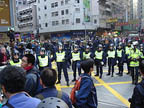
Improving Civic Participation
"Can social media increase and improve civic participation? If so, in what ways? There's a lot being said and written about the subject these days, but it is difficult to get a clear overview of the opinions. I attempt here to collect viewpoints both for and against the premise that social media is creating a better public sphere, and analyze them in the context of what constitutes a public and its antithesis, a mass. In presenting what are sometimes extreme positions within this debate (too idealistic v. too critical), my hope is to begin to understand the reality that lies in the middle, and come closer to understanding social media's potential (and limitations) as a tool to bring about social change.
At a general level, we could say that on one side of the debate are those who believe that social media can increase civic participation and shift the balance of power away from the institutions that currently stand in the way of change. On the other side are those who warn that social media can only offer a reduced form of participation, that it diminishes the value of individual contributions, and that it leaves social systems more prone to manipulation by lowering their intelligence to the minimum common denominator (i.e., stupidity or mediocrity).
Thus, the debate can be framed in terms of whether social media can engender democratic publics that embody an intelligence and capacity for action greater than the sum of its members, or whether it will merely continue to support the production of anti-democratic masses of disenfranchised and alienated consumers. Of course, social media is a big label encompassing many different technologies, and even the same technologies can be applied differently in various contexts. But while features and applications might differ, the people contributing to this debate are obviously focused on the aggregated impact that social media is having on our societies rather than on specific examples of applications." Continue reading Social Media and the Networked Public Sphere by Ulises Ali Mejias.

